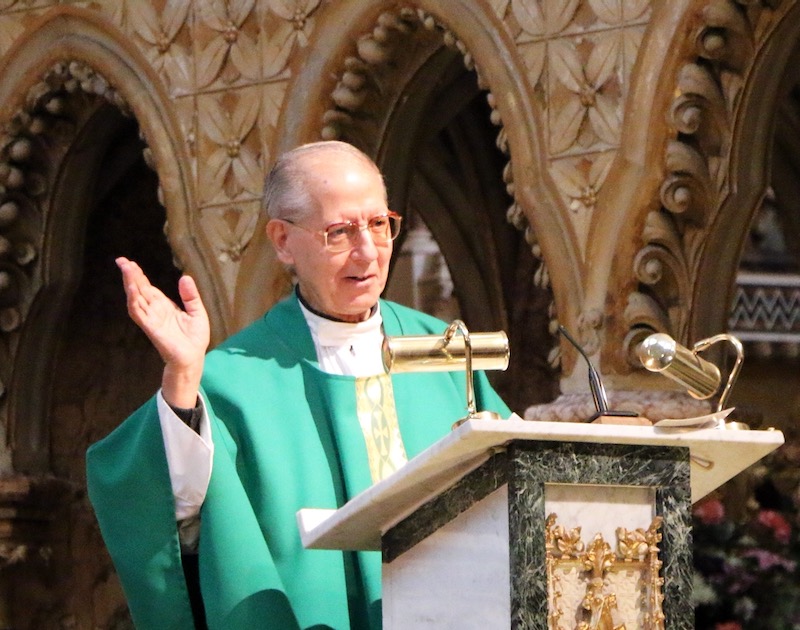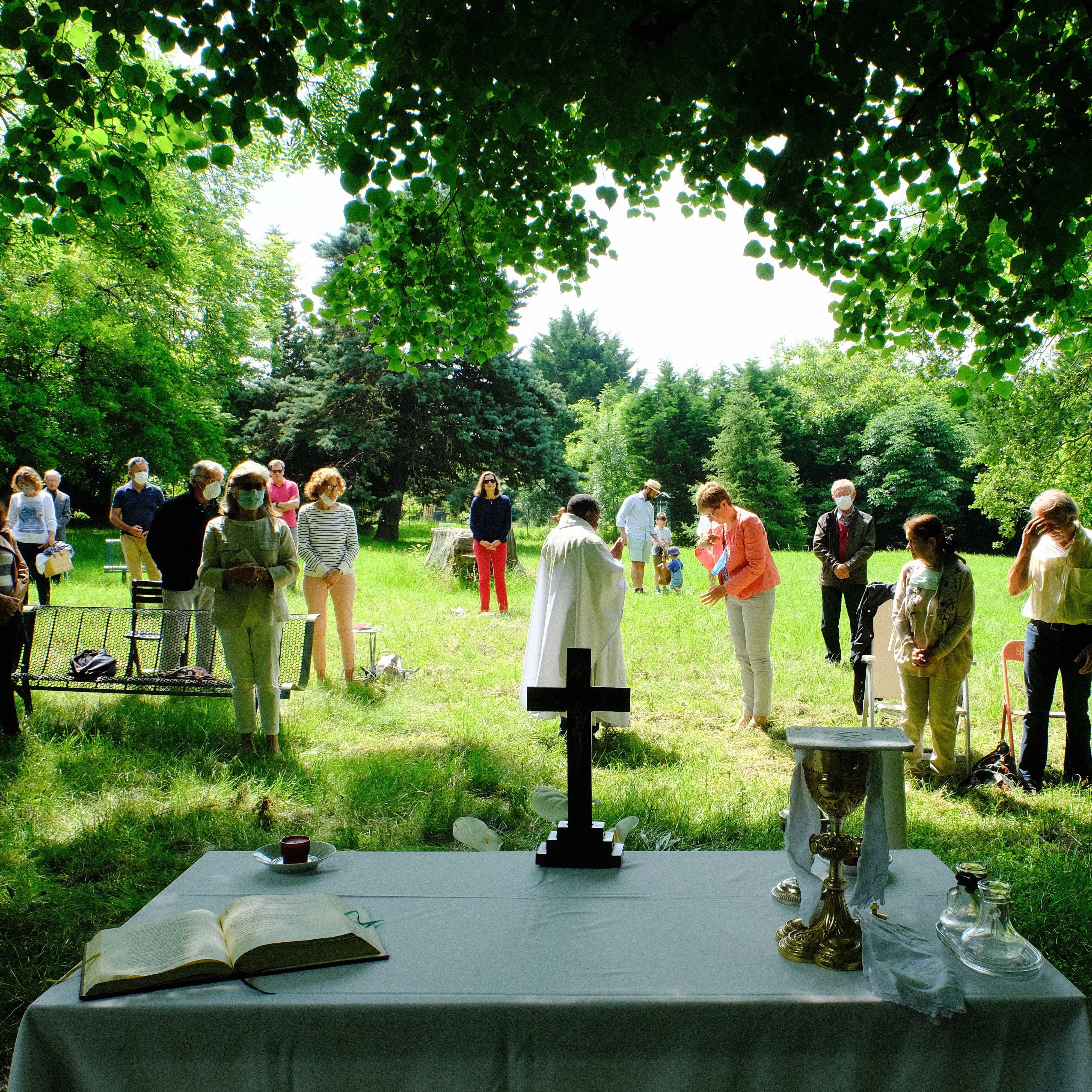Greetings to you in Oxford – and wherever you are. I am really glad to be able to share this Mass with you even if it is from down here in central London!
I am sure each one of you knows that this pandemic experience is going to have a major effect on your future. It’s going to leave a deep imprint on everything, on human lives, on communities, on society, politics, our sense of our place in nature, even our faith.
I suspect that you will have found yourself reflecting more or less consciously on that future. This morning I want to offer some thoughts about how a follower of Jesus should look to the future. But let me start with a word about how NOT to do so. Because there is incessant media speculation right now about what the future holds, and I’ve noticed that it falls into three genres, each attractive but probably unhelpful.
The first is utopian. You may have seen a wonderful video called “The Great Realisation” produced by a young London poet which went viral a few weeks ago. It predicts that this pandemic will have a positive transformative effect on us all, helping us to live simpler more sustainable lives, to focus on our relationships and our local community, instead of foreign travel and Netflix. It’s a beautiful vision. But you’d have to say it’s naïve. It doesn’t tell us anything about how we get from where we are to where we all want to be. That’s not a criticism of the poet – it’s just true of utopian visions in general.
The second type is the opposite: dystopian. “It’s the greatest economic collapse in three hundred years! A new era of incessant plague! Civilisation itself is on the brink of collapse! Big money or big tech or big pharma is taking over everything.” Don’t get me wrong: I enjoy apocalypse as much as anyone. But no-one knows any of these things for sure. And crucially, apocalyptic thinking lets us off the hook of taking responsibility for anything. With dystopia, nothing is to be done because nothing can be done.
Finally, there is the “steady-state view”, which says, well actually things will go back to normal after all this is over; the utopians and the dystopians are exaggerating for dramatic effect, clickbait. We have weathered storms like this before. Life will go on. The not so subtle message is: don’t bother even trying to change anything for the better.
All those voices have two things in common. The first is that they disempower us. They deny us our agency. Secondly, and this is somehow linked and more important, they leave God totally out of the picture. Utopians tell us that human beings are sweet and reasonable and that we can sort out this huge mess all on our own. Dystopians say that our darkness and wretchedness will destroy us, and that God is not going to help. The steady-state folk are really just deists who think that God may have set our world up long ago but He doesn’t take much interest in us these days.
It is somewhat reminiscent of that other crisis which came up in the first reading. Think of the disciples after the Ascension of Christ. I bet there were utopians among them: “with Jesus in heaven, there will be no more evil in the world! Welcome to the sunlit uplands of the Kingdom!” There were certainly dystopians among them: “behold the end times! destruction and collapse is all about us.” And some of Jesus’ followers must have wondered if following Him all the way to the cross and the empty tomb had actually made that much difference to anything at all. I can’t help thinking of Simon Peter saying: “I’m going fishing!”
But here’s the thing: God is in the picture now just as He was then. If you look at two millennia of Church history – it’s been neither utopian, nor dystopian, and most certainly not business as usual. It’s been wholly unpredictable. First there were the martyrs, then the Fathers of the Church, then the monks, then the great European missionaries, the friars of the Middle Ages, the complexity of the Christian life after the Reformation. It’s been a rollercoaster of blessing and grace, struggle and death and new life. That shouldn’t surprise anyone who believes in the incarnation and in the paschal mystery. Because this God is always creating anew. There is no steady state. Jesus Christ isn’t that kind of person, as you will notice if you read the Gospels attentively.
So how does a disciple of Christ come at the future? You could sum it up by saying that we may not have a clear notion of where we are headed, but we know the way, we know how we are going to get there. That iconic image of the disciples gathered in the upper room in unceasing prayer gives us a clue. The way consists of three things: community, prayer and presence.
Presence: because His presence transforms everything. It makes any sacrifice bearable. It brings out the good in us: the joy, the peace, the compassion, the desire to be open to the stranger… These are things that make another future possible, a creative, surprising future with a place for everyone.
Prayer: because it changes the nature of our agency, infusing it with God’s own creativity. As St Paul puts it, it’s no longer me but Christ in me. When I pray, I make space for God. By a kind of osmosis, His priorities, His vision, His memory and understanding, His way of loving move in and become mine. One of the simplest but most powerful ways of praying is to begin and end each day with the Lord, offering ourselves intentionally for His mission, and then giving thanks at the end of the day for all that has happened, all the gifts received, especially the mercy with which He treats our sins. That way, over time, I become an instrument of God’s action in the world.
Community: because we can’t do much as separate individuals. God’s way of saving the world is to take a people unto Himself and to breathe His very Spirit into their common life. Our Catholic Christianity has always been social in its purview, never narrowly individual. It’s about people living together. And so the great transformations of Christian history have usually turned on the emergence of new forms of Christian community. Pope Francis calls for this in Laudato Si’: “We must regain the conviction that we need one another, that we have a shared responsibility for others and the world.”
From now on, it really is “God with us” in the profoundest possible way. That’s why the icon of the disciples in the upper room is so consoling. In establishing this new community God has opened a space in which He can construct a future for us in partnership with us. This young Church, full of sinners, so intensely human, is now also intensely divine, full of saints. The future depends on God in us and us in God.
So, to you young Catholics as you come out into the post-COVID world into an uncertain future, I say: at the heart of your lives must be the weekly, or even better, daily Eucharist, Christ coming to His people again and again. Remembering His real presence in the here and now is the foundation for a future full of hope. Cultivate your inner lives by establishing a solid habit of daily prayer. Find ways to share your Christian life. I am pleased that the Chaplaincy is a hub of community for the Catholics of Oxford. I am indebted to the Chaplains for making spiritual direction available to so many of you, and providing opportunities for you to make the Spiritual Exercises. And having commended to each and every one of you the practice of daily prayer let me assure you that you are all in mine.
This sermon was originally preached by Damian Howard S.J on the 7th Sunday of Easter 2020, to the University of Oxford Chaplaincy, by zoom.



 Loading ...
Loading ...
What do you think?
You can post as a subscriber user ...
User comments (0)